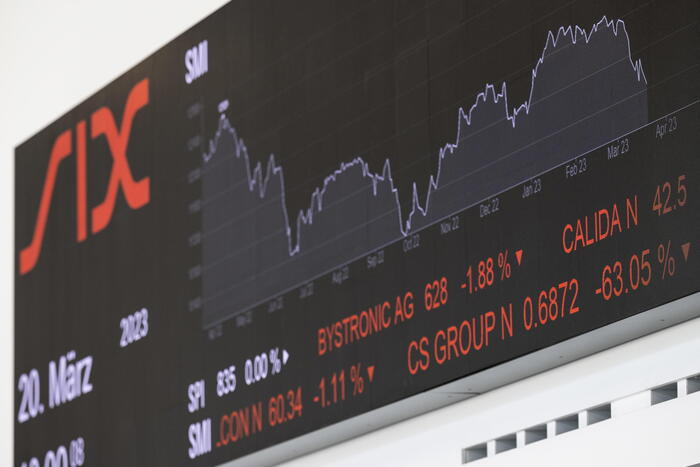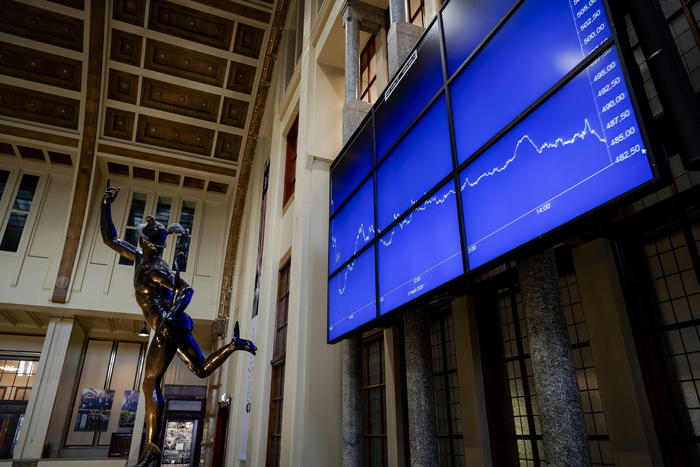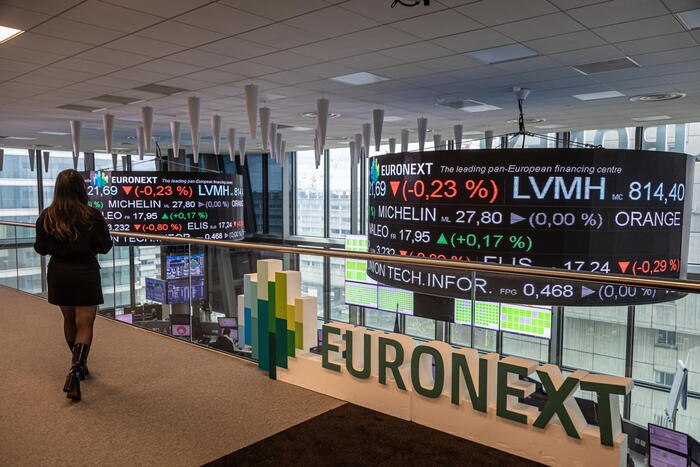Enlarge image
Shell Rhineland Refinery
: In the Wesseling plant, the oil giant no longer wants to process crude oil from 2025, but instead produce hydrogen and biofuels.
Photo: Christoph Hardt / imago images/Future Image
The boom in energy prices brought oil and gas giants BP and Shell back to sharp gains last year after a loss-making 2020.
BP even achieved its best result in eight years in 2021, as the group announced in February.
The company earned $7.56 billion net.
Its Anglo-Dutch rival Shell, which recently dropped the "Royal Dutch" from its name, made around $20 billion in profit.
A year earlier, the two oil and gas companies were still in the red.
Oil prices collapsed due to the oversupply, especially at the beginning of the pandemic.
As a result, oil companies had to write off billions of dollars on the valuation of commodity futures contracts they had entered into to hedge against fluctuations in the markets.
In addition, Hurricane Ida caused damage to the conveyor systems and production downtime.
At Shell, this resulted in a net loss of $21.7 billion in 2020.
BP posted a loss of $20.3 billion.
Significant recovery after the horror year 2020
Since then, Shell's business has recovered faster than its British peers in terms of net income.
BP, on the other hand, grew a little more than Shell with its sales growth of almost 50 percent compared to the previous year.
Both groups benefited from higher prices for oil, electricity and liquid gas, which increased significantly due to the scarce gas supply and increased demand as the economic recovery progressed.
For example, key European gas prices and Asian natural gas prices rose to record levels in the fourth quarter.
In November, BP's CEO
Bernard Looney
said the company was a "money machine" at current levels of oil and gas prices.
The Ukraine crisis is now flushing additional money into the coffers of the oil and gas multinationals.
Concerns about armed conflicts between Russia and Ukraine and the associated scarce oil stocks are driving the price of North Sea Brent crude oil to almost $100 a barrel. This should keep the profits of the two energy giants high in the first quarter of 2022 as well.
Investors, governments and courts are putting pressure on them
So the corporations are making a lot of money again.
But the pressure to restructure in view of climate change has grown.
Activists, governments, courts and investors are forcing oil companies to become more sustainable.
Large institutional investors are turning their backs on oil and gas companies and are more likely to invest their money in sustainable businesses.
Major Dutch pension fund ABP announced in October that it would sell its €15 billion stakes in the oil, gas, auto and aviation industries by 2023, including its stake in Shell.
Sustainable investing along so-called ESG criteria ("ESG" stands for "Environmental, Social and Governance") is also gaining in importance for other investors.
What also speaks in favor of a rapid restructuring of the industry is the concern about aggressive climate activist investors.
BP and Shell don't want to experience the same as American rival Exxon Mobil.
A mini-hedge fund brought three of its own candidates to the Exxon board of directors in 2021.
His goal: to turn the oil giant upside down for climate protection.
So it would make strategic sense for the two oil giants to use the bubbling profits to restructure.
They also do this – but set different accents.
And they also want to serve the shareholders – which limits the scope for investments.
Billions for share buybacks and dividends
Both Shell and BP therefore put part of the high profits into share buybacks in the billions.
Shell's CEO
Ben van Beurden
(63) also announced that it would increase the dividend per share by four percent for the first quarter.
According to Van Beurden, investments for 2022 should be at the lower end of the 23 to 27 billion range after 20 billion last year.
BP was reluctant to pay dividends for the time being.
For the fourth quarter of 2021, the company keeps the dividend constant at 5.46 US cents per share.
BP boss Bernard Looney (52) plans to increase investments to 14 to 15 billion US dollars after 12.8 billion in the previous year.
"We're accelerating the greening of BP," said Looney.
Accelerate "greening": BP is planning a hydrogen infrastructure with RWE
BP aims to cut its oil and gas production by 40 percent by 2030 (from 2019 levels) while expanding its renewable energy business.
"Low-carbon" investments are to be increased, for example in the areas of charging stations for electric vehicles, hydrogen and bioenergy including biofuels, biogas and sustainable aviation fuel.
These growth areas are expected to account for more than 40 percent of BP's total capital expenditures by 2025, rising to around 50 percent in 2030.
When it comes to hydrogen, BP in Germany is cooperating with RWE, among others.
Together with other partners, they want to build a cross-border infrastructure for hydrogen.
In Lingen im Emsland, where one of the two German BP refineries is located, RWE is soon to produce green hydrogen using two electrolysers.
From 2024, this will supply the larger BP refinery in Gelsenkirchen.
Existing gas network lines are to be used to transport the hydrogen.
The cooperation partners, who applied for funding from the Federal Ministry of Economics for the project under the name "GET H2" in 2021, plan to save around 16 million tons of CO2 by 2030 by using green hydrogen in refineries, in steel production and other industrial sectors.
In another cooperation with the Danish energy company Ørsted, world market leader in offshore wind energy, BP is planning to build a 50 megawatt electrolyser for the production of green hydrogen on an industrial scale in Lingen.
This could be supplied with electricity from Ørsted's offshore wind farm.
BP also applied for funding for this.
Wind farms off the coast of Scotland - 15 percent share with renewable energy by 2030
Like the other oil giants, BP invests in wind farms, both onshore and offshore.
In January, BP, together with the Karlsruhe energy group EnBW, was awarded the contract for a wind farm with a capacity of almost three gigawatts off the east coast of Scotland.
Investors will only see in a few years whether the strategy works.
Kim Fustier
, an oil and gas analyst at HSBC Bank, said in 2021 that even BP's relatively rapid transformation does not go far enough to reduce climate damage.
She expects BP's revenue from renewable energy and low-carbon businesses to account for just 4% to 5% of total revenue by 2025 and 10% to 15% by 2030.
Shell aims to reduce oil production by up to 2 percent each year by 2030
Shell is also pushing ahead with the restructuring of the group in order to reduce its dependence on fossil fuels.
In a historic judgment in May 2021, a Dutch court obliged the oil giant to reduce its emissions significantly more than it had planned.
Environmentalists had complained with reference to the climate protection goals formulated in the Paris Agreement.
Shell then tightened its targets in autumn 2021, but also announced that it would appeal the verdict.
The company has set itself the goal of reducing emissions from its operations and from the energy supplied by half by 2030, compared to 2016 levels. Shell plans to reduce its oil production by an average of one to two percent per year by 2030, by 2050 he wants to be completely climate neutral.
BP has also undertaken the latter.
Analyst
Lydia Rainforth
from the British investment bank Barclays also sees opportunities for shareholders.
Shell is now in the process of setting itself apart from other companies with its customer-centric Powering Progress strategy.
That, coupled with increasing payouts to shareholders, should boost the stock price.
Conversion is also slowly becoming visible in Germany
Shell's restructuring is slowly becoming visible in Germany.
The group announced the sale of eight refinery holdings worldwide in 2021, including the German PCK Schwedt refinery in Schwedt/Oder in the Uckermark, in which Shell controls 37.5 percent.
The group wants to convert its largest refinery in Germany, the Rhineland refinery with the two plants in Cologne-Godorf and Wesseling, into an energy and chemical park.
As the sole operator, Shell no longer plans to process crude oil in Wesseling from 2025, but to produce hydrogen or biofuels, among other things, in new or rededicated plants.
However, the refinery at the neighboring Cologne-Godorf plant is to remain in operation until further notice.
Plant for synthetic aviation fuels
In July 2021, the group commissioned a 10-megawatt plant for the production of green hydrogen in Wesseling, and another electrolysis plant with an output of 100 megawatts is planned.
In addition, a plant is to be built there in which synthetic aviation fuels and petroleum can be produced from green electricity and biomass.
The latest example of how the oil giant is gearing up for climate change is the construction of a manure-based liquefied natural gas plant.
From 2023, 4,000 to 5,000 trucks could be refueled with "bio-LNG".
According to Shell, this should save up to one million tons of CO2 annually compared to a conventional diesel truck.
Some observers are critical of the pace at which the energy giant is being restructured.
"Our concern is that Shell is moving towards lower-yield/lower-value businesses and exiting profitable activities too early," analysts at UBS said after Shell laid out its net-zero plan in 2021, S&P said.
"The strategy for transformation must be judged on both its economic and environmental/ESG scores."
As part of the restructuring, the Anglo-Dutch group recently relocated its headquarters from the Netherlands to the United Kingdom and abandoned its complex share structure.
The move serves Shell to save taxes and defuse a conflict with activist investor Third Point.
He has a large stake in the oil company and has called for the oil company to be split into two separate companies to make Shell more attractive to shareholders.
Hydrogen technology still needs time
Another obstacle is that there is still a long way to go before green hydrogen becomes competitive.
About four fifths of the energy is lost when green electricity is converted into hydrogen.
So it's not particularly efficient.
Large amounts of green electricity are therefore required to use green hydrogen on a large scale.
So far, there are still no buyers for the construction of hydrogen stations, in which Shell is investing in Germany together with partners.
Because there are still only a few and expensive fuel cell cars on the market.
Hyundai and Toyota are offering the first "standard" fuel cell vehicles, and Mercedes has already withdrawn its model from the market.
There are currently 130 hydrogen filling stations in Germany, and the number of conventional filling stations is around 14,500.
Share prices are approaching pre-crisis levels
The stock market has been on the up again for both groups since autumn 2021.
After the share prices of both groups halved between January and March 2020 and then reached their low point in autumn 2020, they are now almost back to the pre-crisis level.
BP, whose shares were traded on the stock exchanges for just EUR 2.21 in 2020, increased their market value by around 38 percent in 2021.
Rival Shell is about twice as heavy with a market capitalization of 182 billion euros.
The group gained around 30 percent in value in 2021.
What is slowing down the restructuring of the two oil giants are, among other things, the short-term interests of the shareholders.
They too want a piece of the pie and want to be kept happy with clean energy investments with high dividends and share buybacks.
The transformation will be anything but conflict-free, said former State Secretary and shadow pope of the energy transition Rainer Baake.
So it all comes down to the right timing.


/cloudfront-eu-central-1.images.arcpublishing.com/prisa/E2WDNTQIINCQBDDGYE4P36PF64.jpg)
/cloudfront-eu-central-1.images.arcpublishing.com/prisa/W3H32IH2DBCPRBEVTMH3MKVBNI.jpg)





